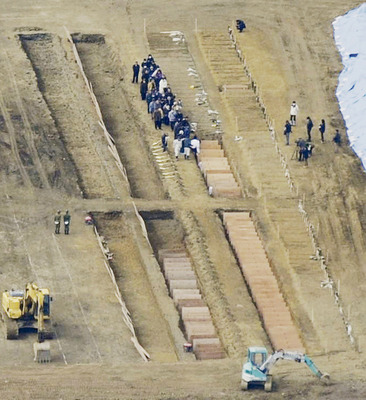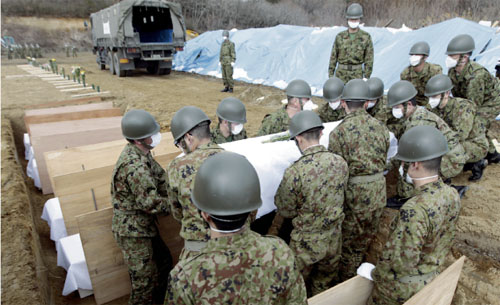Closure elusive after tragedy

The extreme death toll from the March 11 earthquake and tsunami has forced Japanese authorities to resort to mass burials instead of following intricate funeral rituals.

The extreme death toll from the March 11 earthquake and tsunami has forced Japanese authorities to resort to mass burials instead of following intricate funeral rituals. Japan Ground Self Defense Force prepare to lay a coffin in one of the mass graves.


Survivors of the Japanese earthquake and tsunami are facing the epic problem of how to dispose of, yet honor, the bodies of thousands of loved ones who perished in the natural disaster.
The deceased are usually cremated in Japan. But with crematoriums and morgues overwhelmed by the March 11 earthquake and tsunami, there has been no choice but to bury the dead in mass graves with minimal ceremony, news reports say.
The toll in Japan stood yesterday at more than 9,800 bodies found and more than 17,500 people listed as missing, The Associated Press said.
Survivors are left to seek solace in their Buddhist or Shinto (an indigenous religion of Japan) faith, the country’s major religions. Obtaining closure won’t be easy, said the Rev. Reyn Yorio Tsuru, minister and director of the Shingon Shu Hawaii temple.
"Buddhists require cremation in burials — they believe you return from where you came from," Tsuru said, adding it is similar to the Christian concept of "ashes to ashes, dust to dust." Funeral rituals in Japan are much more exacting than those observed by Hawaii Buddhists, he said.
"Buddhist rites help bring about some peace in knowing our loved ones have gone to a better place. The knowledge that many, many thousands are unaccounted for leaves a great void for them. It’s a monumental stress on their part," Tsuru said.
Don't miss out on what's happening!
Stay in touch with breaking news, as it happens, conveniently in your email inbox. It's FREE!
"The psychological considerations will be so far-reaching for many, many, many years because people cannot bring closure to their lives. Some are not going to be able to find the bodies to do a memorial service for."
Irene Takizawa, spokeswoman for the Shinto shrines Hawaii Kotohira Jinsha and Hawaii Dazaifu Tenmangu, said there aren’t many places to conduct funerals amid such destruction. In Japan, funerals are held as soon as possible, unlike in Hawaii, where services are commonly delayed to accommodate the schedules of relatives, Takizawa said.
"It’s almost immediate, because they don’t want to prolong the mourning process; they like to see immediate closure," Takizawa said.
Those of the Shinto faith believe that "we cohabit with nature, which is beyond our control — ’shoganai.’ We just have to move forward and plug on. It’s extraordinarily unfortunate, heartbreaking that so many people passed on, but it’s not going to keep us down. We have to unite and attempt to rebuild," Takizawa said.
Tsuru agreed. "In Buddhism we must accept the obstacles in the world that throw themselves at us and find peace that the world goes on. But this is of very little comfort to individuals (who have lost loved ones). Shingon Buddhists seek comfort in knowing the people we love would not want us to mourn. The best way to memorialize people is to live a good and happy life, and live the Buddha-nature of showing compassion and tolerance to everyone around us."
At the first service he led at Shingon Shu after the disaster, Tsuru said, "we were all holding candles, which are very significant in Buddhist rites, because from a single candle flame we can illuminate the world," he said. "There’s so much beauty in our lives, so much to live for. In the flame we find comfort, it gives you warmth. When you blow the flame out, it’s analogous to how fleeting our lives are. We have to live our lives as a flame, to be the warmth and the illumination for your loved ones."
The Hongwanji Mission of Hawaii, which has 36 temples in the state, belongs to the Jodo Shinshu sect, the largest Buddhist sect in Hawaii and Japan.
Hongwanji Bishop Eric Matsumoto said, "We don’t have prayers to relieve suffering, but disasters such as these lead us to reflect on our world. We are reminded of the changing nature of our existence. Although humankind makes many advances, we are reminded of the power of nature and that we are so limited in what we can do.
"But that doesn’t mean we don’t do anything. We do what we can, and I encourage our members to help in whatever way they can. Those in devastated areas, I encourage not to lose hope; others are reaching out to help," Matsumoto added.
Blayne Higa, chairman of the Hongwanji’s Committee on Social Concerns, said Buddhists believe in "being able to weather the storms of life. It’s not why (there are storms), but how we react to these situations, how we endure and persevere through these difficult times." Japanese culture promotes the belief that "we’re all in this together, and we’re committed to work with each other to get by," he added.
Higa said his committee wanted the bishop to have something in hand to give to Hongwanji’s mother temple, Nishi Hongwanji of Kyoto, last week when Matsumoto went to Japan for his special induction ceremony as the new bishop. The group gave $10,000 for disaster relief efforts, and until August will be holding a special drive to help Japan.




